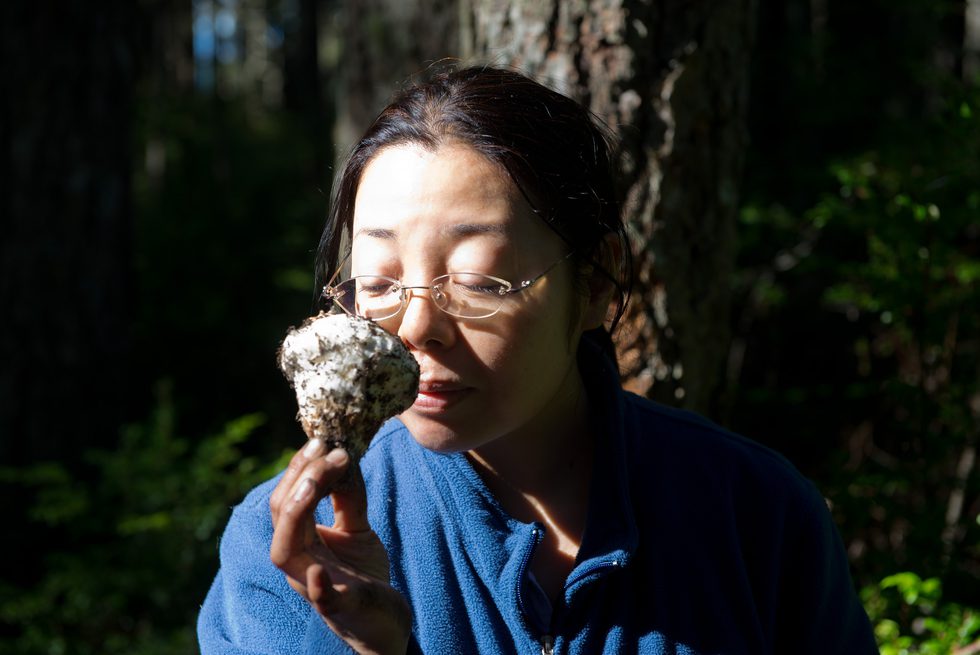What does it mean to “poach” another person’s paper, especially an unpublished one? We tend to rely on an individualistic model of innovation in anthropology, and the vast majority of papers and books by anthropologists are single-authored. We get credit for being the first person to coin a term or offer a new idea or theoretical framework in published form. If we use someone else’s published ideas, we are borrowing and must cite them. If we use someone’s unpublished ideas, we are stealing. How can we do collaborative work under the reign of such notions of intellectual property?
The Matsutake Worlds Research Group has been experimenting with modes of collaboration that can help us think outside these models of knowledge. Their collaboration focuses on matsutake (literally, “pine mushroom” in Japanese), a variety of related species of wild mushrooms that are consumed primarily as a gourmet luxury items in Japan. Matsutake are mycorrhizal mushrooms: they develop through dependent relationships with the roots of certain kinds of trees. The group has been using the mycorrhizal life of matsutake as a figure for illuminating the workings of capital and power, and nature and culture. In December 2009, they decided that some group members would “poach” papers written by other group members. One member, Lieba Faier, offered up a paper contrasting what she called the “vulnerable ecologies” of matsutake pickers in rural Nagano, Japan, with “the ecologies of negotiation” of matsutake traders in Tokyo. Lieba’s aim was to draw attention to the different ways that human and nonhuman relationships—specifically those involving fungi, trees, people, nematodes, beetles, and weather—figure for people in Japan who are differently situated in matsutake commodity networks. The paper meant to show how geographical and social positioning matters to the ways that nonhumans figure in commodity relationships. It also meant to consider how commodity chains themselves emerge through the collision of differently situated human–nonhuman ecologies. Lieba gave a draft of this paper to another group member, Michael Hathaway, so that he could poach it.
Michael reciprocated by sending Lieba some notes for his own paper. In these notes, he proposed to explore the ways that insects and weather shaped the emergence of matsutake networks in Southwest China, a topic he had never considered before. He would also explore the temporality of networks, in which pickers and traders used pesticides and freezers to manage insects and their potential devastation of the matsutake harvest. However, Michael expressed concern that his poaching might lead to work that was simply comparative. He was concerned that his paper would simply show how his research about matsutake in China did and did not match up with the Japanese examples. As Lieba read through Michael’s notes, however, she noticed that his research in China introduced temporal aspects of the trade that she had not considered, such as the ways that insects figured into the timing strategies used by Chinese dealers to maximize profits. His notes also pushed her to think about what she meant by the term ecologies, which she had been using casually to translate across sites. Another image came to mind. In the margins of her printout of his notes, she drew a picture of two abstract forms, where little pieces of one were pushing out toward the other. Lieba came to see poaching as pushing or poking pieces of Michael’s research toward hers, as something of an offering: not an encroachment but a gift.
The English word poach is related to the French word pocher: to push or poke with a finger or pointed instrument, to pierce. Michael had poked out his research project to join Lieba’s, showing her some of the human–nonhuman relationships of matsutake commodity exchange in China and pushing her to think about her research in Japan in new ways. His poaching of her paper offered examples from his research that pushed the boundaries of hers. By infusing her paper with these ideas, he poached it like people poach pears, using red wine and honey to intensify and transform the flavor of the fruit.
We offer this anecdote about poaching in the spirit of generating novel tactics of collaboration and emerging methods of scholarly generosity.
Note
This essay was written collaboratively by members of the Matsutake Worlds Group. It was edited by Eben Kirksey in association with a special issue of Cultural Anthropology entitled "The Emergence of Multispecies Ethnography."
